Archive for September, 2011
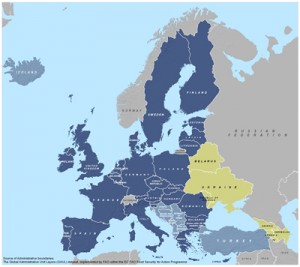
From EU site
The Heads of State or Government and representatives of the Republic of Armenia, the Republic of Azerbaijan, Georgia, the Republic of Moldova and Ukraine, the representatives of the European Union and the Heads of State and Government and representatives of its Member States have met in Warsaw on 29-30 September 2011 to renew their commitment to the objectives and continued implementation of the Eastern Partnership. The President of the European Parliament and the representatives of the Committee of the Regions, the Economic and Social Committee, the European Investment Bank and the European Bank for Reconstruction and Development were also present at the Summit.
The Prague Summit in May 2009 launched a strategic and ambitious Eastern Partnership as a specific dimension of the European Neighbourhood Policy, to further support Eastern European countries’ sustainable reform processes with a view to accelerating their politicalassociation and economic integration with the European Union. The agenda agreed in Prague contains the guiding principles of the Eastern Partnership, and the participants of the Warsaw Summit re-affirm their commitment to implement them fully.
The Warsaw Summit recognises that reinforced reform efforts serve a common interest, and need therefore to be applied in a spirit of shared ownership and mutual accountability. The Eastern Partnership is based on a community of values and principles of liberty, democracy, respect for human rights and fundamental freedoms, and the rule of law. All countries participating in the Eastern Partnership are committed to these values through the relevant international instruments. Any European Union Member State is also committed to them through the Treaty on European Union.
The participants of the Warsaw Summit acknowledge the European aspirations and the European choice of some partners and their commitment to build deep and sustainable democracy. They highlighted the particular role for the Eastern Partnership to support those who seek an ever closer relationship with the EU.
Much has been achieved already. Political and economic reforms have been implemented in partner countries and relations between the EU and its Eastern European partners have deepened significantly. There is more trade and economic interaction between the EU and its Eastern European partners than ever before. In order to consolidate this trend, the EU and most of its partners are engaged in negotiations on Association Agreements which will also lead to Deep and Comprehensive Free Trade Areas as soon as the conditions are met.
At the same time, they are engaged in progressing towards increased mobility across the continent. Dialogues on visa-free regimes have been launched with Ukraine and the Republic of Moldova. Visa-facilitation and readmission agreements are being implemented with Georgia and similar agreements will be sought with the Republic of Armenia, the Republic of Azerbaijan and the Republic of Belarus.
It is part of the essence of the Eastern Partnership to engage with all strands of societies, beyond governments. The Warsaw Summit welcomes the establishment of the Euronest Parliamentary Assembly, as well as the increased role of civil society, through the Civil Society Forum. It welcomes the creation of an Eastern Partnership Business Forum and of the Conference of Regional and Local Authorities of the Eastern Partnership.
Recognising and welcoming the progress made so far, the participants of the Warsaw Summit underlined that much remains to be done to reach the goals of the Eastern Partnership, including by adapting existing instruments of co-operation. In this regard, they welcomed the publication of the Communication of the High Representative and the Commission on the review of the European Neighbourhood Policy. Greater differentiation and mutual accountability will allow individual partners to better meet their aspirations, needs, and capacities. According to these principles, the pace of reforms will determine the intensity of the cooperation, and partners most engaged in reforms will benefit more from their relationship with the European Union, including closer political association, deeper gradual economic integration in the EU Internal Market and increased EU support. This entails support for civil society and social and economic development, as well as comprehensive institution-building, strengthening respect for human rights and the rule of law, greater market access, increased EIB financing in support of investments and greater facilitation of mobility in a well-managed and secure environment. The resolution of conflicts, building trust and good neighbourly relations are essential to economic and social development and cooperation in the region.
The participants agree that the Eastern Partnership must be significantly strengthened and commit to stepping up its implementation, with the objective of building a common area of democracy, prosperity, stability and increased interactions and exchanges. They also agree that the achievements and the progress of the Eastern Partnership must bring direct and clearly perceived benefits to the citizens of partner countries, and they commit to enhancing their efforts to make the Eastern Partnership visible to all.
—
The Heads of State or Government and representatives of the Republic of Armenia, the Republic of Azerbaijan, Georgia, the Republic of Moldova and Ukraine, the representatives of the European Union and the Heads of State or Government andrepresentatives of its Member States, are committed to the success and the development of the Eastern Partnership, and have therefore agreed to the following:
1. Adeeper bilateral engagement: Political association, Socio-Economic integration and Mobility.
2. Participation in EU programmes and Agencies and enhanced sector cooperation.
3. Strengthening of multilateral co-operation.
Full statement – Warsaw Summit – 29-30 September 2011
Cattolici russi in festa: centenario della consacrazione Cattedrale dell’Immacolata Concezione.
29 Sep 2011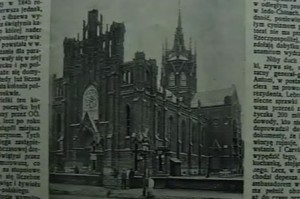
Giornale polacco 1911 - catedra.ru
«L’hanno deturpata, sconsacrata, ridotta in una fabbrica. Ma alla fine la fede ha prevalso sull’ideologia comunista. La storia della Cattedrale dell’Immacolata Concezione di Mosca è una storia di sofferenza e redenzione. Esempio sublime di stile neogotico, la Cattedrale ha attraversato il Novecento assieme al popolo cristiano della Russia. Una storia straordinaria che è stata ricordata dall’Inviato del Papa, il cardinale Jozef Tomko, nella celebrazione per il centenario della Consacrazione.
Una Messa celebrata con vescovi e sacerdoti russi, ma anche provenienti dalla Bielorussia, dal Kazakhistan, dalla Lituania, dalla Polonia e dagli Stati Uniti. Ecco la riflessione del porporato sull’importanza di questo centenario, raccolta da Andrei Tarasov:
“Una storia che rispecchia quella della Chiesa nell’Unione Sovietica. E’ una storia commovente di 100 anni, anche se la cattedrale non è stata usata per tutto il secolo ma solo per 50 anni. La Messa si celebrava fuori, sulle scale, anche d’inverno, per affermare visibilmente il desiderio ed il diritto dei fedeli ad averla. Queste sono cose commoventi, che riguardano la professione della fede da parte di questo popolo. Un popolo che esprime la propria fede non solo con la testa ma anche con il cuore”.
La Cattedrale dedicata a Maria fu la prima chiesa cattolica di Mosca ad essere chiusa dai bolscevichi. Era il 1937: il parroco fu fucilato, i fedeli perseguitati. Seguì un inverno di oltre 50 anni che non riuscì però a spegnere la luce della fede in Cristo. Caduto il comunismo, i cattolici moscoviti dovettero aspettare fino al 1999 per la nuova consacrazione dell’edificio. Da allora, è tornato ad essere il cuore pulsante della comunità cattolica a Mosca. D’altro canto, il cardinale Tomko sottolinea che questo centenario non guarda solo al passato, ma è un segno di speranza per il futuro della Chiesa russa:
“Anche la giovane Chiesa russa sta crescendo. E’ importante che questa trovi espressione ed abbia le sue vocazioni”.
In questo centesimo anniversario, tornano alla memoria le parole che l’arcivescovo Tadeusz Kondrusiewicz, pronunciò commosso al momento della restituzione della Cattedrale ai suoi fedeli: “Anche a Mosca, che nel periodo sovietico è stata considerata la capitale dell’ateismo, l’ultima parola è quella di Dio”».
Alessandro Gisotti – Radio Vaticana
EUBAM and SECI Center team up for BRUT project.
27 Sep 2011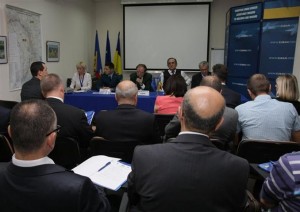 Project BRUT, an initiative of the SECI Center, to which the European Union Border Assistance Mission to Moldova and Ukraine (EUBAM) has become a partner, was launched in Odessa.
Project BRUT, an initiative of the SECI Center, to which the European Union Border Assistance Mission to Moldova and Ukraine (EUBAM) has become a partner, was launched in Odessa.
A project covering multiple levels of law enforcement activities, such as countering drug trafficking, preventing the proliferation of weapons of mass-destruction, developing integrated border management, BRUT additionally aims to strengthen the customs capabilities in the major sea ports of the Black Sea region, and to upgrade risk-management systems.
Those participating in BRUT – a name taken from the first letters of the participating countries, and which runs in Odessa until Friday – include representatives from SECI Center member states, specifically from the ports of Varna and Burgas (Bulgaria), Constanta (Romania), Ambarli (Turkey) and Odessa (Ukraine) itself. Observers from Moldova, and representatives from the Dutch Customs Administration, the Central Asian Regional Information and Coordination Centre (CARICC), the United Nations Office on Drugs and Crime (UNODC), and the US Department of Energy, will also attend.
“The BRUT project is further proof of the strong emphasis EUBAM places on international cooperation,” said the head of EUBAM, Mr Udo Burkholder, during this morning’s opening remarks. “Coordination of our efforts is vital in tackling all manner of illicit activities. We are delighted to be teaming up with the SECI Center once again for this initiative.”
“Project BRUT’s scope primarily focuses to put the foundation stone for building up a solid bridge of long term law enforcement cooperation across the Black Sea region, connecting countries and international law enforcement organizations from Europe and Asia,” stated Petros Petroff, SECI Center Deputy Director.
BRUT is a result of a 2005 initiative and a follow-up to the SECI Center’s Kalkan project, conducted in the same region in 2009, when EUBAM acted as observer. It also complements EUBAM’s Operation Phenomena, which is being carried out at Odessa and Illychevsk ports in southern Ukraine.
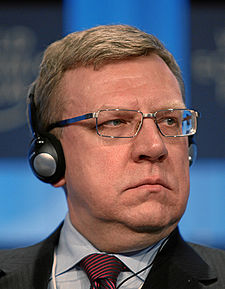 Aleksej Kudrin sbatte la porta e se ne va. Le clamorose dimissioni del ministro delle Finanze sono la prima conseguenza della scelta di Vladimir Putin di tornare al Cremlino dopo le presidenziali di marzo, lasciando la carica di primo ministro all’attuale leader russo, Dmitrij Medvedev.
Aleksej Kudrin sbatte la porta e se ne va. Le clamorose dimissioni del ministro delle Finanze sono la prima conseguenza della scelta di Vladimir Putin di tornare al Cremlino dopo le presidenziali di marzo, lasciando la carica di primo ministro all’attuale leader russo, Dmitrij Medvedev.
Sabato notte da Washington, dopo una riunione dell’FMI, Kudrin aveva dichiarato che, per la prima volta dopo un decennio, non avrebbe fatto parte di un Esecutivo federale. E’ risaputo che Medvedev ed il “Tremonti” russo hanno punti di vista diametralmente opposti sulla gestione del budget federale. In primo luogo sulle spese militari. Kudrin, assai apprezzato negli ambienti internazionali, è stato una specie di signor “niet” che ha stretto i cordoni della borsa prevedendo l’attuale crisi, che mette in serio pericolo la crescita economica della Russia.
L’eccessiva dipendenza delle entrate dalla vendita delle materie prime sul mercato mondiale provoca enormi preoccupazioni. L’aumento del deficit, prodotto da spese interne non preventivate e da misure “popolari” nell’anno delle elezioni, dà da pensare. Recentemente Kudrin ha comunicato che se in precedenza il pareggio di bilancio era calcolato con un prezzo medio del petrolio a 90 dollari il barile, nel 2011 è sui 109 e nel 2012 intorno ai 112. Per fortuna sua la Russia ha oltre 550 miliardi di dollari in riserve.
Kudrin, pertanto, stanco delle pressioni delle troppe “lobbies” che ruotano intorno al potere politico moscovita, ha preferito uscire di scena non potendo più contare su una certa indipendenza garantitagli dall’ala protettrice di Putin. Dalla sede dell’FMI, ha avvertito tutti: “il prossimo sarà un decennio perso” per la crisi finanziaria internazionale e i suoi effetti sulle economie mondiali.
Cinquantunenne, pietroburghese, con una lunga esperienza affianco di Anatolij Sobciak (il “mentore” di Putin) il liberale Kudrin ha amministrato i petrodollari, che hanno finanziato il boom economico di inizio secolo, ed ha mantenuto brillantemente in ordine il bilancio dello Stato durante la crisi successiva al 2008. Lascia in Russia un vuoto difficilmente colmabile. Secondo alcuni analisti pesanti possono essere le ripercussioni finanziarie per sue dimissioni.
Путляндия вперед!
26 Sep 2011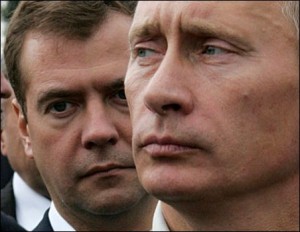 «Объединитель племен Аравийского полуострова король Ибн Сауд так любил своих подданных, что решил сделать их всех членами своей семьи. Новое государство было названо по фамилии короля — Саудовская Аравия. Путин до таких крайностей не дошел. Но теперь Российскую Федерацию можно смело именовать Путляндией. ВВП в очередной раз доказал, что пока в российской политике ему посильно все…. кругах, близких к «Единой России», в последнее время много говорят: предвыборная кампания партии власти пробуксовывает. Избиратели устали от чрезмерно долгого правления одних и тех же лиц (или, вернее, одного и того же лица) и не демонстрируют особого горячего желания горячо поддержать партию власти…
«Объединитель племен Аравийского полуострова король Ибн Сауд так любил своих подданных, что решил сделать их всех членами своей семьи. Новое государство было названо по фамилии короля — Саудовская Аравия. Путин до таких крайностей не дошел. Но теперь Российскую Федерацию можно смело именовать Путляндией. ВВП в очередной раз доказал, что пока в российской политике ему посильно все…. кругах, близких к «Единой России», в последнее время много говорят: предвыборная кампания партии власти пробуксовывает. Избиратели устали от чрезмерно долгого правления одних и тех же лиц (или, вернее, одного и того же лица) и не демонстрируют особого горячего желания горячо поддержать партию власти…
Премьерство будет для Дмитрия Анатольевича далеко не таким приятным и политически безопасным занятием, каким оно было для Владимира Владимировича. Путин был самостоятельным и несменяемым премьером, потому что он Путин, а вовсе не в силу особенностей этой должности…
Премьеру Медведеву придется еще тяжелее. Как и во времена премьеров Фрадкова и Зубкова, ключевыми министерствами будут вновь напрямую рулить из Кремля…
Все очень четко осознают: президент Медведев фактически не мог снять премьера Путина. Президент Путин может снять премьера Медведева в любой момент — стоит ему только пожелать….
Главной проблемой президента Путина будет та же самая проблема, с которой сейчас сталкивается «Единая Россия» в ходе предвыборной кампании: психологическая усталость населения от отсутствия реальных перемен наверху.
Путин правит Россией уже больше 11 лет… После энного количества лет пребывания у власти начальник теряет способность генерировать новые идеи и новые подходы. Власть начинает ходить кругами…»
Статья – Михаил Ростовский – Московский Комсомолец № 25755 от 26 сентября 2011 г. Mikhail Rostovsky Moskovskij Komsomolets
“Thousands of minority Poles on Friday protested a new law in Lithuania that they claim discriminates against them and could diminish their education by demanding greater knowledge of the Lithuanian language.
The protests outside Parliament in the capital Vilnius underscored the contentious issue of language rights in Lithuania, a subject that has been the cause of tension in its relations with Poland.
Ethnic Poles number about 200,000 of Lithuania’s 3 million citizens, mainly the result of shifting borders after World War II. Many of these Poles speak Polish at home and attend Polish-language schools. But the law, which passed in March and took effect in July, introduces standardized Lithuanian exams for all upper-class students, which minorities believe will put them at a disadvantage vis-a-vis native speakers….
Waldemar Tomaszewski, a member of the European Parliament from Lithuania, said the government should “postpone this law until 2018 or maintain the right for students of ethnic minorities to pass exams in their native language.”
Over the past year, the language issue has led nationalist politicians in Poland and Lithuania to trade barbed criticism. Lithuania’s Polish residents are upset that they cannot spell their name in legal documents with the letter ‘w‘ _ a prominent letter in Polish that doesn’t exist in the Lithuanian alphabet…”
Full Article – Associated Press – Taiwan News
Berlin Syndrome, Joosten’s haunting debut novel.
25 Sep 2011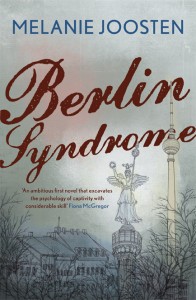 «Small-town Australia in the 1950s. I grew up knowing my parents came from a place called Poland. About Poland itself Iknew very little, ignorance that remained unchanged until I was an adult.
«Small-town Australia in the 1950s. I grew up knowing my parents came from a place called Poland. About Poland itself Iknew very little, ignorance that remained unchanged until I was an adult.
From early on, I knew Poland was ‘‘behind the Iron Curtain’’, which I actually conceived of as just that: one long curtain made of iron stretching right down from Gdansk to Trieste. (That’s a lot of curtain hooks, I know). Couldn’t get in. Couldn’t get out. Not the people; nor information about them. If I wondered at all about Poland, I came up with blanks every time. Truth is I didn’t know what I didn’t know until much later.
Yet I’ve always had a strange sense of emptiness, of a prison without walls, of a sameness and greyness, a place of silence and stillness, of unkempt cemeteries, of places overgrown, a barren landscape locked out of time.
I’ve never lost that sense, nor sought to disconfirm it. And within a few pages of starting Berlin Syndrome, it was with me again.
Melanie Joosten’s haunting debut novel is set in 2006 in the east of the once-divided German city. Pretty quickly you pick up on the ambience – the peculiar character of life in an ex-Soviet satellite.
The Russians are gone. The wall is down, sold off in thousands of fragments. But a frisson of the old Iron Curtain remains…».
Review – Ruth Wajnryb – The Sydney Morning Herald – September 24th, 2011.
Украина и Таможенный союз.
25 Sep 2011 «Cоздан Таможенный союз России, Беларуси и Казахстана. Однако без Украины новый российский интеграционный проект никогда не станет полноценным. В любом случае, России не удастся создать свой ЕС (ЕврАзЭС) в противовес ЕС….
«Cоздан Таможенный союз России, Беларуси и Казахстана. Однако без Украины новый российский интеграционный проект никогда не станет полноценным. В любом случае, России не удастся создать свой ЕС (ЕврАзЭС) в противовес ЕС….
– – –
Еще 1,5-2 года назад при запуске интеграционного проекта Москва не сильно тянула Украину в ТС, полагая, видимо, что скоро другого выбора у нее все равно не останется. Теперь же Кремль едва ли не требует вступления в новое объединение. Решающим для Украины при выборе интеграционного приоритета может стать испытание российским газом…
После избрания президентом Украины Виктора Януковича Кремль обрел надежду увидеть Украину в Таможенном союзе. И вслед за этим предпринял настойчивые попытки, заманивая ее дешевым газом, кооперацией, перспективными проектами и беспошлинной торговлей.
Показалось даже, что Киев действительно может вернуться в орбиту кремлевского влияния. И первые шаги В. Януковича на президентском посту это подтверждали… Завершающим этапом интеграционных процессов должно было стать объединение “Газпрома” и “Нафтогаза”.
На каком-то этапе Киев начал колебаться…
Россия пообещала заплатить хорошую цену за согласие — 8 млрд. USD в год за счет отмены пошлин на газ, плюс снятие ограничительных мер для украинских производители черных металлов и труб и т. д. Более того, ради вступления Украины Россия готова была серьезно пожертвовать даже тарифной защитой собственного рынка, чему она так противилась в ходе переговоров о вступлении в ВТО…
Вслед за этим министр иностранных дел Украины Константин Грищенко, выступая 22 апреля перед депутатами, заявил, что Украина провозгласила стратегический курс на евроинтеграцию, частью которого является создание зоны свободной торговли с ЕС и не намерена менять этот курс…
– – –
Сотрудничать с Таможенным союзом Украина собирается вне рамок формального членства в нем. Для этого она предложила формулу 3+1.
Недавно Россия заявила, что считает неприемлемым сотрудничество Украины с Таможенным союзом в формате “3+1”, речь может идти только о полноценном вступлении Киева в Таможенный союз. Чтобы принудить Украину вступить в Таможенный союз, Кремль может использовать всевозможные средства, в том числе угрозы повысить таможенные пошлины на украинские товары и держать высокими газовые цены.
Российско-украинские газовые соглашения подписаны в январе 2009 года на 11 лет. В них предусмотрена базовая цена на газ для Украины в 450 USD/тыс. куб. м, она меняется раз в квартал в зависимости от цен мазута и газойля на мировых рынках за последние 9 месяцев.
В апреле 2010 года в обмен на право сохранить российский флот в Севастополе до 2042 года Украине была предоставлена скидка на российский газ, которая действует по 2019 год включительно. Она предусматривает, что при контрактной цене на газ ниже 333,33 USD/тыс. куб. м пошлина обнуляется, если же цена выше, то пошлина составит 30% контрактной цены минус 100 USD.
На фоне недавнего роста мировых цен на нефть, к которой привязана и стоимость газа, цены на газ для Украины постоянно росли. В первом квартале цена составляла около 264 USD/тыс. куб. м, а во втором – почти 296 USD/тыс. куб. м. По прогнозам Минэнерго Украины, в третьем квартале цена может вырасти до 350 USD/тыс. куб. м, а в четвертом — превысить 400 USD/тыс. куб. м.
Цена газового вопроса для Украины очень высока и она стремительно растет. Украина закупает ежегодно примерно 40 млрд. куб. м российского газа. В 2009 году страна заплатила “Газпрому” за поставки газа около 6 млрд. USD, в 2010 году — 9,2 млрд. USD, за первые семь месяцев 2011 года – более 7,5 млрд. USD….
Пытаясь снизить зависимость от российского поставщика, Украина заявила о планах значительного сокращения импорта — предполагается, что с 2012 года Украина снизит закупки российского газа на треть, до 27 млрд. куб. м, а через 5 лет, согласно планам, Одновременно ставится задача увеличить внутреннюю добычу газа за 5 лет с 20 млрд. до 27 млрд. куб. м…
В то же время и Украине, чтобы снизить эту зависимость, потребуется несколько лет — терминал по приему сжиженного газа в стране планируется построить в 2015 году.
Отношения между Украиной и Россией могут достигнуть апогея уже нынешней зимой. Противостояние вновь может перерасти в очередную газовую войну».
Статья – Татьяна Маненок – БГД – Деловая Газета –
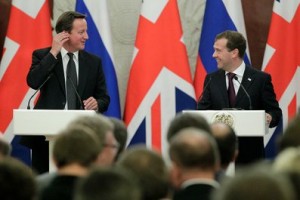
Medvedev Cameron - Kremlin press service
Timidi raggi di sole nelle relazioni russo-britanniche anche se i problemi da risolvere sono ancora tanti. Da dopo il caso Litvinenko – l’ex agente del Kgb ucciso a Londra con il polonio nel novembre 2006 – un premier di Sua Maestà non veniva in visita ufficiale a Mosca.
David Cameron ha incontrato prima il presidente Medvedev poi il primo ministro Putin. “Abbiamo sistemi legali differenti – gli ha detto il capo del Cremlino -. Un cittadino russo non può essere estradato. Non lo permette l’articolo 65 della Costituzione”. Scotland Yard sospetta dell’omicidio Andrej Logovoj, oggi deputato alla Duma. Il premier britannico ha annuito, ma ha segnalato che la questione rimane aperta e non va assolutamente ridimensionata. Mosca e Londra non riattiveranno per ora i contatti sospesi tra i due servizi di sicurezza in funzione anti-terrorista.
Lo stato di diritto, aveva rimarcato Cameron in precedenza in un discorso davanti agli studenti dell’Università di Mosca, è “vitale” anche per gli investimenti stranieri. Numerosi sono i dissidi tra compagnie dei due Paesi con interferenze della nomenklatura. Gli uomini d’affari d’oltre Manica si lamentano dell’eccessivo grado di corruzione in Russia, ma Medvedev ha risposto che anche nel Regno Unito tale piaga esiste.
Intellettuali e politici britannici hanno pubblicamente chiesto al loro premier di riferire a Putin – evitato dopo l’autunno 2006 da tutte le massime cariche del Regno Unito – che le prossime parlamentari russe, previste per il 4 dicembre prossimo, non saranno considerate “democratiche” in Occidente se ai partiti dell’opposizione non verrà permessa la partecipazione.
La Russia ha posto condizioni per una risoluzione ONU sulla Siria. Il Cremlino non vuole assolutamente dare carta bianca agli occidentali come successo in Libia.
«— Вы что, серьезно хотите поехать учиться в Россию? Все ведь уезжают оттуда! Так приветствовали меня в российском посольстве в Берлине минувшей зимой…В посольстве тесно и душно, и приходится объяснять какому-то невежливому чиновнику, почему я хочу учиться в России…
Я родилась в Германии, в Берлине. Мой папа — немец, а мама — русская. Они воспитывали меня на двух языках, и мы часто ездили в Россию….Мне всегда было важно, что меня представляли не только как немку, но и как русскую. Вот почему немецкие друзья окрестили меня Russin. Но по-настоящему я ничего не знала o России…
И вот в 16 лет мне наконец-то стало стыдно…Решив заполнять пробелы в самоидентификации, я поехала в Санкт-Петербург…Все оказалось по-другому, чем я представляла. И школьная система, и жизнь подростков в России сильно отличается от Германии…
У меня началось чуть ли не раздвоение личности, когда я на себе прочувствовала различия двух народов!… В классе меня приняли хорошо. В первый же день спросили, не хочу ли я пойти в Мариинский театр, а потом на день рождения к однокласснице, а потом в гости к друзьям, и так далее, и так далее…В Германии иностранку ни за что бы так быстро не приняли в круг друзей. Сначала чужак должен доказать, что достоин этого!..
И вот начались мои школьные будни….»
Статья Настя Кёлер Московский Комсомолец № 25730 от 27 августа 2011 г. Nastia Koehler Moskovskij Komsomolets.
Welcome
We are a group of long experienced European journalists and intellectuals interested in international politics and culture. We would like to exchange our opinion on new Europe and Russia.
Categories
- Breaking News (11)
- CIS (129)
- Climate (2)
- Energy&Economy (115)
- EU Eastern Dimension (85)
- Euro 2012 – Sochi 2014 – World Cup 2018, Sport (43)
- Euro-Integration (135)
- History Culture (198)
- International Policy (261)
- Military (74)
- Interviews (18)
- Italy – Italia – Suisse (47)
- Odd Enough (10)
- Poland and Baltic States (126)
- Religion (31)
- Russia (421)
- Survey (4)
- Turning points (4)
- Ukraine (176)
- Российские страницы (113)
Archives
- November 2020
- October 2020
- September 2020
- August 2020
- July 2020
- May 2020
- April 2020
- March 2020
- January 2020
- December 2019
- November 2019
- October 2019
- September 2019
- August 2019
- July 2019
- June 2019
- May 2019
- April 2019
- March 2019
- February 2019
- December 2018
- November 2018
- October 2018
- September 2018
- August 2018
- July 2018
- June 2018
- May 2018
- April 2018
- March 2018
- February 2018
- January 2018
- December 2017
- November 2017
- October 2017
- September 2017
- August 2017
- July 2017
- May 2017
- March 2017
- January 2017
- December 2016
- November 2016
- October 2016
- September 2016
- July 2016
- June 2016
- May 2016
- April 2016
- February 2016
- January 2016
- November 2015
- October 2015
- September 2015
- June 2015
- April 2015
- March 2015
- February 2015
- January 2015
- December 2014
- November 2014
- October 2014
- September 2014
- August 2014
- July 2014
- June 2014
- May 2014
- April 2014
- March 2014
- February 2014
- January 2014
- December 2013
- November 2013
- October 2013
- September 2013
- August 2013
- July 2013
- June 2013
- May 2013
- April 2013
- March 2013
- February 2013
- January 2013
- December 2012
- November 2012
- October 2012
- September 2012
- August 2012
- July 2012
- June 2012
- May 2012
- April 2012
- March 2012
- February 2012
- January 2012
- December 2011
- November 2011
- October 2011
- September 2011
- August 2011
- July 2011
- June 2011
- May 2011
- April 2011
- March 2011
- February 2011
- January 2011
- December 2010
- November 2010
- October 2010
- September 2010
- August 2010
- July 2010
- June 2010
- May 2010
- April 2010
- March 2010
- February 2010
- January 2010
- December 2009
- November 2009
- October 2009
- September 2009
- August 2009
Our books




